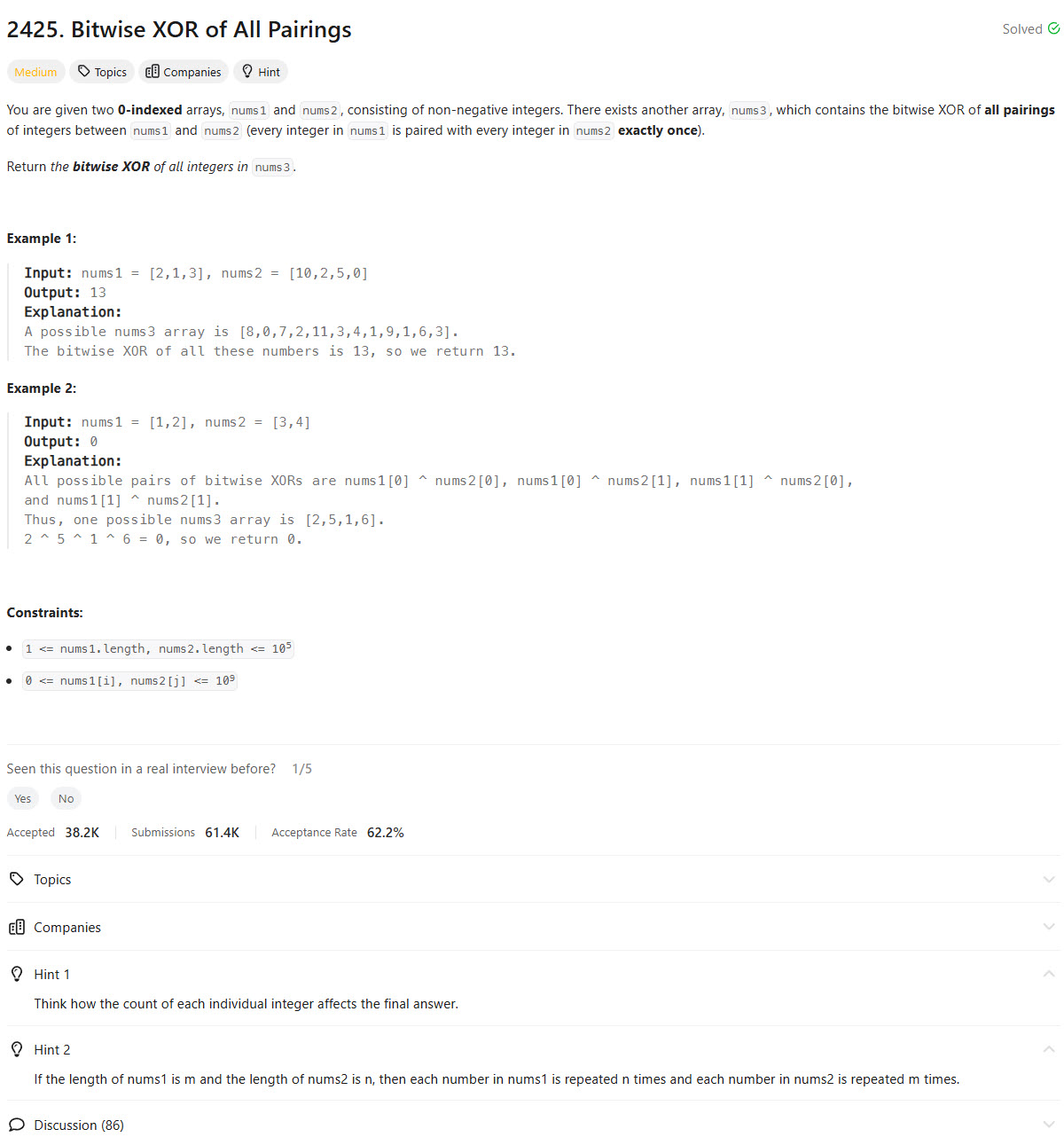Problem of The Day: Bitwise XOR of All Pairings
Problem Statement

Brute Force [TLE]
class Solution:
def xorAllNums(self, nums1: List[int], nums2: List[int]) -> int:
res = 0
for x in nums1:
for y in nums2:
res = res ^ x ^ y
return res
Intuition
The problem involves finding the XOR of all elements resulting from the Cartesian product of two arrays. This can be simplified based on observations about the XOR operation:
- XOR is commutative and associative, allowing flexibility in the order of operations.
- Duplicating numbers in XOR cancels them out (e.g., (x \oplus x = 0)).
- The XOR of the Cartesian product depends on the lengths of the arrays and their parities (even or odd).
Approach
- Analyze the problem mathematically:
- Each number in
nums1is XORed with all numbers innums2, and vice versa. - If the length of an array is even, each number in the other array is XORed an even number of times and cancels out.
- If the length is odd, every element contributes to the result exactly once.
- Each number in
-
Identify cases based on array lengths:
- Both
nums1andnums2have even lengths: No contribution to the XOR result as all elements cancel out. - One of the arrays has an odd length: Contribute all elements of the other array to the XOR result.
- Both arrays have odd lengths: All elements from both arrays contribute to the XOR result.
- Both
- Implement the logic:
- Use simple loops to compute the XOR based on the identified cases.
Complexity
- Time complexity:
- (O(\max(n, m))), where (n = \text{len(nums1)}) and (m = \text{len(nums2)}). This is because, in the worst case, we iterate through one of the arrays entirely.
- Space complexity:
- (O(1)), as we only use a constant amount of additional space.
Code
class Solution:
def xorAllNums(self, nums1: List[int], nums2: List[int]) -> int:
res = 0
n = len(nums1)
m = len(nums2)
if n % 2 == 0 and m % 2 == 0:
res = 0
elif n % 2 != 0 and m % 2 == 0:
for x in nums2:
res ^= x
elif m % 2 != 0 and n % 2 == 0:
for x in nums1:
res ^= x
else:
for x in nums2:
res ^= x
for x in nums1:
res ^= x
return res
Editorial
Approach 1: Hash Map
class Solution:
def xorAllNums(self, nums1: List[int], nums2: List[int]) -> int:
# Get lengths of arrays
len1, len2 = len(nums1), len(nums2)
# Dictionary to store frequency of each number
freq = {}
# Add frequencies for nums1 elements
# Each element appears n2 times in final result
for num in nums1:
freq[num] = freq.get(num, 0) + len2
# Add frequencies for nums2 elements
# Each element appears n1 times in final result
for num in nums2:
freq[num] = freq.get(num, 0) + len1
# XOR numbers that appear odd number of times
ans = 0
for num in freq:
if freq[num] % 2:
ans ^= num
return ans
Approach 2: Space Optimized Bit Manipulation
class Solution:
def xorAllNums(self, nums1: List[int], nums2: List[int]) -> int:
# Initialize XOR results for both arrays
xor1, xor2 = 0, 0
# Get lengths of both arrays
len1, len2 = len(nums1), len(nums2)
# If nums2 length is odd, each element in nums1 appears odd times in final result
if len2 % 2:
for num in nums1:
xor1 ^= num
# If nums1 length is odd, each element in nums2 appears odd times in final result
if len1 % 2:
for num in nums2:
xor2 ^= num
# Return XOR of both results
return xor1 ^ xor2